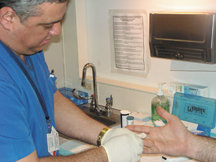When Union City resident Cornelio Torres needs his blood pressure checked or requires other health screenings, he doesn’t have to get out his wallet.
Instead, he uses the mobile van provided by the federally funded North Hudson Community Action Corporation (NHCAC), a non-profit health care agency for low-income people countywide.
“I come every month,” said Torres at the Union City stop in January. “It’s a good service.”
The NHCAC mobile health unit has been in existence for almost 10 years, traveling through the community providing information, a variety of health screenings, and assistance with WIC (Women, Infant and Children nutrition program) enrollment. Usually parked near senior centers or large residential buildings, the van visits a different Hudson County location every day.
“Many people come back to get screened every month.” – Rosbel Diaz
________
The van is also used in emergency management. Last year, when some schools were closed due to the H1N1 virus, NHCAC worked in conjunction with the Center for Disease Control to use the van as a site for H1N1 testing and information.
Into the community
Christopher Irizarry, president of the North Hudson Community Action Corporation, said that van is an important component of NHCAC’s mission to get out into the community.
“It heightens people’s realization that health is important,” said Irizarry. “We are trying to make people cognizant of their health care and help them manage health issues.”
Irizarry said that the mobile unit is helpful for some people who are unable to get to the NHCAC community health centers, which already provide a myriad of health services to residents in eight locations throughout Hudson County.
Rosbel Diaz, a certified medical assistant, is the primary care giver in the mobile van unit and works in conjunction with driver Fabio Alvarez to bring the services to the community.
“It’s like a family,” said Alvarez, who has been a driver for NHCAC for 8 years. “I like giving service to the community.”
Diaz, who has been working with NHCAC for 2 years, was a medical doctor in Cuba for 15 years and is using his experience of providing health education to patients every day in the mobile unit.
“I enjoy building relationships with the patients,” he said. “Many people come back to get screened every month.”
An annual report is compiled by Diaz at the end of the year to track the community services provided in the mobile health unit. According to his report, nearly 8,000 people were served in 2009. Of those screened, most were over age 40, and more than half had abnormal results for high glucose, high blood pressure, or high cholesterol.
Diaz referred those with abnormal results to clinics where the patients could follow up with their health care service. Diaz also provided on the spot health orientation with steps the patients could start taking immediately to improve their health levels.
Dental care and other programs
The NHCAC has many new programs planned for implementation in 2010. First of all, the website will be revamped this month to help community members navigate the information and services provided.
A new mobile unit will also be hitting the streets sometime this year, specializing in dental care. The creation of a dental mobile unit was made possible by a grant the NHCAC received as part of President Obama’s stimulus package.
Although the details of the unit are tentative, the dual chair van will most likely provide cleanings and other routine work. The logistics are still being hashed out about the extent of work to be conducted.
As with all NHCAC programs, the dental mobile unit will be able to accept people with and without health insurance. An “uncompensated care fund” is available for those who qualify.
Earlier this month, the North Hudson Community Action Corporation launched a health literacy outreach program aimed at Latinos in Hudson County.
A $231,000 grant was provided by the Robert Wood Johnson Foundation to fund the initiative through its New Jersey Health Initiatives program.
Project HELP (Health Education Literacy Program) is a three-year educational outreach effort to make Latinos more aware of critical health issues and steps they can take to address these issues.
Irizarry said that while the program was open to all interested patients, they are planning to focus on patients with asthma, diabetes, and patients who are obese.
Further information about all of the services provided by NHCAC and the monthly schedule for the NHCAC mobile van is available at www.nhcac.org. To find out more about the services offered at NHCAC health centers, call (201) 210-0200.
Lana Rose Diaz can be reached at ldiaz@hudsonreporter.com.
